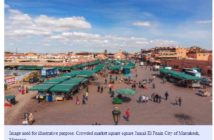EBRD
- Morocco’s GDP to fall by 2 per cent in 2020 due to impact of coronavirus
- Rebound of 4 per cent expected in 2021
- Growth could be sustained by non-agricultural growth, particularly mining
Morocco’s economy will decline by 2 per cent in 2020 because of the economic impact of the coronavirus pandemic, but a 4 per cent rebound is expected in 2021, according to the latest forecast by the European Bank for Reconstruction and Development (EBRD) published today.
The latest edition of the EBRD Regional Economic Prospects report says that the slowdown will be driven by a sharp decline in tourism, measures to contain the spread of the pandemic, a likely poor harvest, a recession in Europe and lower commodity prices.
Growth could be sustained by non-agricultural growth, particularly mining. Morocco is the world’s second-largest producer of phosphate after China.
In the EBRD southern and eastern Mediterranean region, the negative impact of the coronavirus is expected to be seen in the tourism sector, a decline in domestic demand due to containment measures, a fall in demand from the main trading partners and a slowdown in foreign direct investment.
On average, the economies of the region are expected to shrink by 0.8 per cent in 2020 before rebounding with growth of 4.8 per cent in 2021.
Jordan, Morocco and Tunisia are expected to contract this year, while Egypt is projected to report a small growth rate of 0.5 per cent. Lebanon, which had already fallen into recession in 2018 and 2019, is likely to see an especially sharp fall of 11 per cent in 2020.
Economies across the EBRD regions may contract on average by 3.5 per cent this year, with a rebound of 4.8 per cent possible in 2021, the report said, warning that the projections are subject to “unprecedented uncertainty”.
The report assumes a modest impact of the crisis on the long‐term trajectory of economic output, with growth resuming towards the end of the third quarter, but potentially significant longer-term economic, political and social effects.
“If social distancing remains in place for much longer than anticipated, the recession may be much deeper, with the 2019 levels of output per capita not attained again for years to come,” the report said.
Across the EBRD regions, containment measures have affected domestic demand and supply. External shocks include a sharp drop in commodity prices, weighing on commodity exporters, disruption to global value chains, a collapse in tourism and a drop in remittances.
The EBRD invests in emerging economies from central and eastern Europe through to Central Asia and the Middle East and North Africa.







